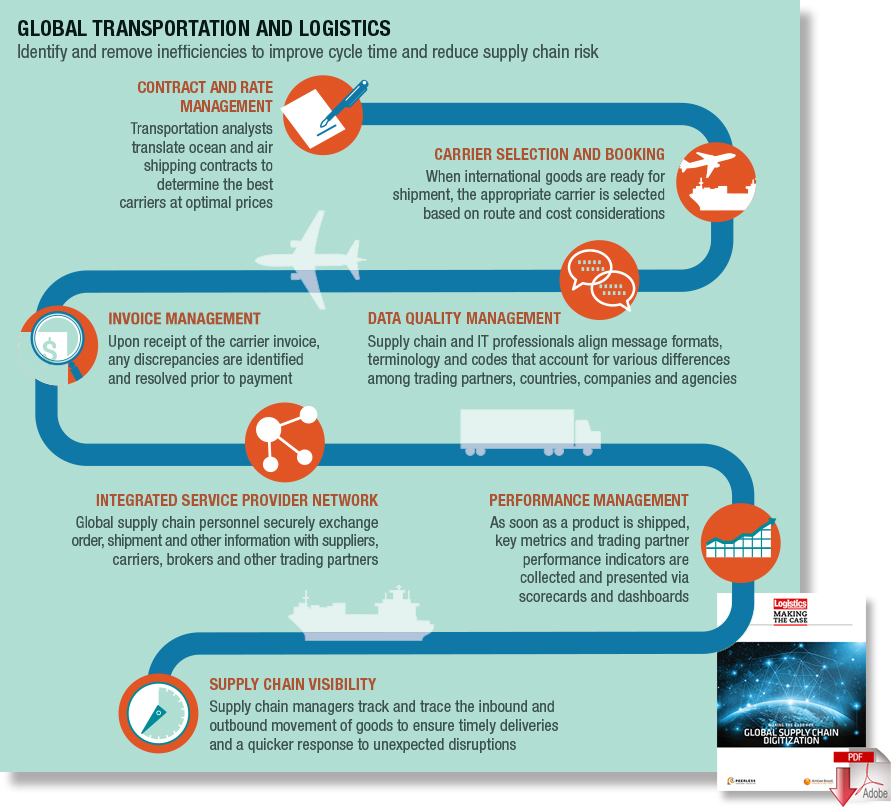Logistics Platforms: Ways Companies Can Win In the Digital Era

A digital logistics industry deserves truly digital solutions – that means open, interoperable, and building on what has gone before, not making the same old mistakes in new ways.
Shipping Is Going Through Momentous Change
Everyone involved, whether carrier, port operator, forwarder or shipper, knows that they need to evolve the way they operate in order to effectively serve and support their current and future customers.
With that has come a hundred and one different solutions.
They are all promising to be the silver bullet to shipping’s woes, should they be operational inefficiencies, lack of transparency, antiquated systems or the inability to manage data effectively.
From online booking platforms to next-generation tech, the sector is being assailed by a variety of ways to optimize, amplify and digitalize their business operations.
It might be new agile entrants; it might be old platforms being refactored for the digital age.
Whatever the situation, they all claim that their way is the best.
However, they often gloss over the underlying issues – that in an industry that is said to be a relationship-business, no one shares unless they have to, and no one trusts even their supposed partners.
Thankfully, we are starting to see offerings that put forward a more connected approach.
These solutions, such as the approach E2open is taking with its acquisition and integration of INTTRA, Cloud Logistics and Amber Road, promise a more cooperative future for those that can afford the investment. But that in itself is an issue.
Only targeting the largest enterprises precludes a considerable part of the market, effectively damning all but the biggest to operating in the same inefficient ways as before.
That, in turn, will have an impact on how much value the major players can extract from any solution - they still need to deal with smaller operations, and a segregated approach forces them, in effect, to create other approaches to deal with those suppliers and customers that cannot afford the E2opens of the world.
Shipping is not just a handful of carriers, a couple of port operators, and some multinational forwarders. While a selection of players may dominate market share, there are still thousands of other businesses that stand to benefit from the digitalization of the sector, if they have access to the right technology.
What does that look like? It means open, easy to use, with multiple ways to finance (whether upfront or on an ongoing basis). Most importantly, it means being interoperable. To be able to connect to both legacy systems and new platforms, irrespective of whether they are on-premise or in the cloud.
Why does that matter? Because historically, carrier A had one system, and carrier B had another, while forwarder C had a third, and the port operator required something else. It meant duplication of effort, even when the data being inputted was the same, just in different formats. When something is interoperable, it does not matter if everyone has a different system or piece of software – whatever is being plugged in shares the data in the way required, without reformatting or additional input. Suddenly, the resources required are drastically reduced.
Make it interoperable, and everyone will realize the potential impact of going digital – the speed to market, the agility to capitalize on fast-approaching opportunities, the efficiencies. The opportunity to expand interactions with customers and improve relationships while increasing visibility gives interoperability a competitive edge over a closed system approach.
If shippers, forwarders and the like, stick to private platforms, that require upfront investment or buy-in to benefit, all that has happened is that the inefficiencies and issues that have existed in the past will simply transfer to the cloud.
That means, the problems that dogged the pre-digital era, the duplication of work, the lack of communication and transparency, will now be much faster and have the potential to spread much further.
Any vendor, or indeed any customer of said vendors, that thinks the closed box, proprietary technology approach of the past is going to help them win big is not thinking long term.
They may well secure short-term gains, but in doing so they will ensure that the problems that hold the sector back now are simply glossed over.
In short, any solution that does not consider the entire industry, and thinks only about the biggest players, is no different from the platforms it claims to be replacing.
A digital logistics industry deserves truly digital solutions – that means open, interoperable, and building on what has gone before, not making the same old mistakes in new ways.
Read: Do More Global Shipping with Less Work by Implementing Blockchain Resources & Technologies
John Monarch, CEO of ShipChain
Entrepreneur, Blockchain Expert, Consultant, Writer, Speaker
John Monarch builds, advises, and consults for businesses. A graduate of Clemson University in Physics and Computer Science, he is the founder and CEO of ShipChain & Direct Outbound - two of the fastest-growing fulfillment and e-commerce logistics companies in the United States. He is an avid investor, advisor, and enthusiast in Blockchain technology. John resides in Greenville, South Carolina, one of the fastest-growing cities in the United States.
Related Article: Transforming Your Global Supply Chain Digitization
Everyone wins when all parties are working from the same version of the truth and able to take the appropriate action to optimize their portion of the supply chain.

Related White Papers
Making the Case for Global Supply Chain Digitization
In this report from Logistics Management, learn how an industry-wide movement toward digitization is making supply chain processes more effective and efficient with technology. Download Now!
Digitization Creates a Strong Value Chain: Generating Cost Reductions
This white paper looks into how digitization itself is a means to an end; the end goal is to derive the most value from a supply chain, but a majority of companies are still struggling to advance. Download Now!
Digitization Creates a Strong Value Chain: Creating the Global Supply Chain Control Tower
In this white paper, we discuss how technology solutions have come a long way in the past decade, and how companies that seek to stay on the forefront are embracing advances that give them an edge over the competition. Download Now!
More Resources fon Digital Transformation
Article Topics
Amber Road News & Resources
Logistics Platforms: Ways Companies Can Win In the Digital Era Ethical Sourcing – The Business Imperative (and Advantage) How Rules of Origin Really Do Make a Difference for Sourcing Practices E2open’s acquisition of Amber Road is a done deal E2open Completes Acquisition of Amber Road Bridging the Data Gap Between Sourcing and Logistics Medical Technologies Company Remedies Complex Compliance Operations More Amber RoadLatest in Supply Chain
How Supply Chains Are Solving Severe Workplace Shortages SAP Unveils New AI-Driven Supply Chain Innovations How Much Extra Will Consumers Pay for Sustainable Packaging? FedEx Announces Plans to Shut Down Four Facilities U.S. Manufacturing is Growing but Employment Not Keeping Pace The Two Most Important Factors in Last-Mile Delivery Most Companies Unprepared For Supply Chain Emergency More Supply Chain


















